The Dragon Keeper: Power, Responsibility, and Mystique
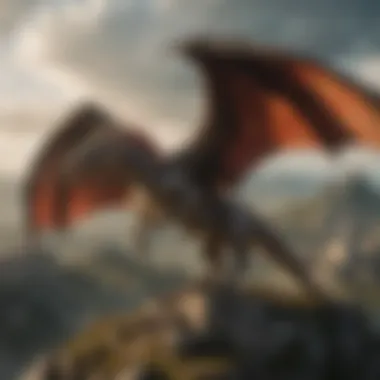
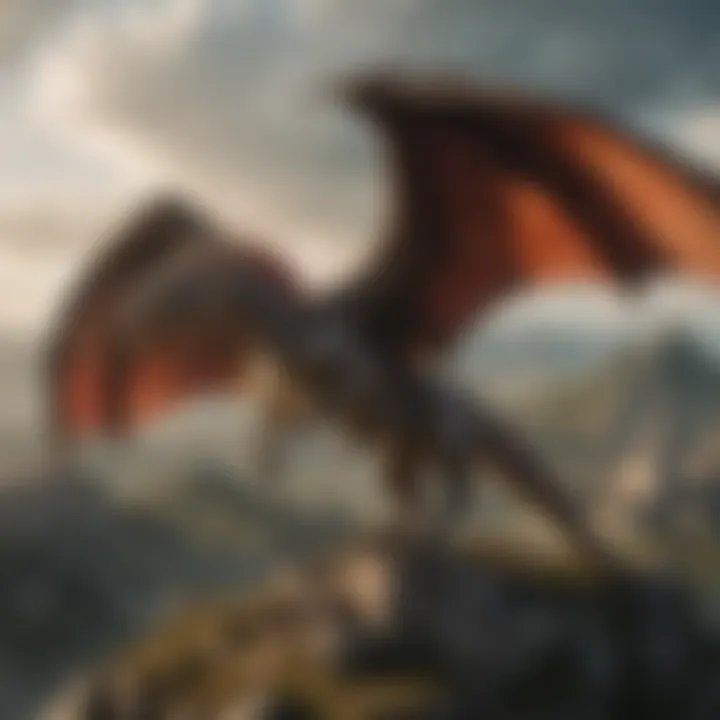
Intro
The role of the dragon keeper in the Game of Thrones universe goes beyond mere caretaking. It taps into deeper themes of power, responsibility, and the ethical dilemmas faced by those who hold dominion over one of the most formidable creatures in myth. Understanding dragon keepers requires a thorough exploration of how they interact with dragons, the historical context of this relationship, and the personal struggles they encounter. As the series unfolds, dragon keepers serve not only as guardians but also as pivotal figures that influence the political dynamics of Westeros.
Character Dissections
In this section, we will analyze key characters associated with dragon keeping, particularly focusing on Daenerys Targaryen. Daenerys, as the last surviving member of a once-great house, is deeply intertwined with the thematic elements of power and responsibility associated with dragons. Her journey from being a pawn in political games to becoming a formidable leader is marked by her evolving relationship with her dragons: Drogon, Rhaegal, and Viserion.
Daenerys' character development reflects various psychological aspects of being a dragon keeper. At first, she is timid and vulnerable, finding strength through her bond with her dragons. Over time, however, her reliance on them becomes a source of both power and arrogance. She faces critical moments that challenge her ethical considerations regarding control and ownership.
Another crucial figure is Jon Snow. Although not a typical dragon keeper, his growing affinity with Daenerys and surprising connection to the Targaryen legacy adds complexity to his character. His moral compass contrasts with Daenerys’ often ruthless approach, particularly when it comes to the use of dragons for warfare. This relationship exemplifies the tension between responsibility and raw power.
By examining these characters, we understand how their interactions with dragons impact the overarching narrative. Each decision they make resonates throughout the series, affecting not just their fate but that of all Westeros.
Lore Explorations
The lore surrounding dragons in Westeros adds depth to the understanding of dragon keepers. Historically, dragons were revered as symbols of power, intimately connected with the Targaryen bloodline. The practice of dragon keeping was initially seen as a privilege held only by those of noble lineage, highlighting the socio-political implications of ownership.
In analyzing the lore, it is essential to uncover how dragons influenced the rise and fall of various houses. The Dance of the Dragons, a civil war among the Targaryens, serves as a poignant reminder of the destructive potential of these creatures.
The cultural significance of dragons is also notable. They embody freedom, destruction, and, at times, the tragic burden of responsibility. Their mystique extends beyond the battlefield, playing a role in shaping the beliefs and fears of people across Westeros.
Fan Theories
The relationship between dragon keepers and their dragons has spawned numerous intriguing fan theories. One popular theory suggests that Daenerys’ dragons are not merely beasts but sentient beings with their own motivations. This raises questions about the ethical implications of their treatment and the autonomy of dragons in a world dominated by human desires.
Another theory posits that the fate of dragons is closely tied to the Targaryen line. Some fans speculate that without a Targaryen alive, dragons may become extinct, thus highlighting the fragility of their existence alongside the holders of their power. Speculation and analysis of these theories contribute additional layers to the narrative, allowing fans to engage deeper with the source material.
The exploration of dragon keepers reveals a tapestry of narrative complexity, characterized by the interplay of power dynamics, ethical considerations, and the mythological significance of dragons. Through character dissection, lore analysis, and fan theories, we can appreciate the multi-faceted roles these guardians hold in the stories woven throughout Westeros.
Foreword to the Concept of Dragon Keepers
The role of dragon keepers is crucial within the realm of fantasy, especially in the context of Game of Thrones. These individuals navigate a complex relationship with dragons, acting as caretakers, protectors, and sometimes, enslavers. They embody a mix of power and responsibility that adds depth to the narrative. Understanding this concept is important for analyzing the dynamics in the series and the implications it carries about control.
Dragon keepers face various challenges. Their responsibilities extend beyond mere custodianship; they must also grasp the intricate nature of these powerful creatures. The bond formed between a keeper and a dragon is not only physical but also emotional and psychological. This aspect creates a unique narrative tension and explores themes of loyalty, betrayal, and sacrifice.
As we delve deeper into this topic, we will investigate not only the characteristics that define dragon keepers but also how their historical context within fantasy literature shapes our understanding of their role. By doing so, we gain insight into the broader themes of power and responsibility that resonate throughout the Game of Thrones saga.
Defining the Dragon Keeper
A dragon keeper can be seen as more than a simple caretaker. They are individuals who hold a position of significant influence and power. Their role involves understanding the behavior and needs of dragons, a task that requires both skill and intuition. This relationship can often be fraught with tension due to the unpredictable nature of dragons. A keeper must demonstrate not just authority, but also respect and empathy towards these creatures.
Being a dragon keeper entails rigorous training and a deep commitment to the creature's wellbeing. This training encompasses a myriad of tasks, such as feeding, health maintenance, and ensuring the dragon's emotional stability. Consequently, the position of dragon keeper is steeped in both prestige and peril.
Historical Context in Fantasy Literature
The archetype of the dragon keeper has its roots in historical myths and legends across various cultures. In many tales, dragons symbolize untamed nature or formidable power that demands respect. The figure of the dragon keeper appears frequently, often depicted as a hero or a guardian. However, their portrayal varies significantly depending on the narrative.
In classical literature, dragon keepers are seen as courageous figures who balance the tension between control and care. They often face moral dilemmas regarding the treatment of the creatures they protect. This theme recurs in Game of Thrones, particularly through the character of Daenerys Targaryen. Understanding this historical context adds layers to the concept of dragon keepers in the series, showcasing how these narratives shape our perceptions of power, authority, and responsibility.
The Role of the Dragon Keeper in Westeros
The position of the dragon keeper in Westeros is a multifaceted responsibility intertwined with themes of power and control. These individuals are more than mere caretakers; they embody the connection between humanity and these majestic creatures. The profession implies a deep understanding of the dragons themselves and the complex interplay of power dynamics that shape their relationship with humans. In a world where dragons symbolize strength and dominance, the role of the dragon keeper becomes pivotal in maintaining balance and navigating the tumultuous landscape of the realm.
Origins of Dragon Keepers
The inception of dragon keepers can be traced back to ancient Targaryen lore. Historically, these keepers have arisen from the ruling houses, particularly the Targaryens, who were known for their affinity with dragons. This bond was crucial during times of war and peace alike. Dragon keepers were often selected based on their lineage and demonstrated loyalty to the dragons, which were once considered extensions of the Targaryen power.
The connection to dragons provided political leverage and stability within the realm. Given that dragons were feared, the responsibility of keeping them fell on those who understood the level of control required to command such powerful beings. The keepers’ role was not only to manage the dragons but also to symbolize the might of the crown itself. Thus, dragon keeping evolved into an intertwined tradition of responsibility and governance.
The Training and Responsibilities
The journey to becoming a dragon keeper involves rigorous training and understanding the intricate responsibilities associated with it.
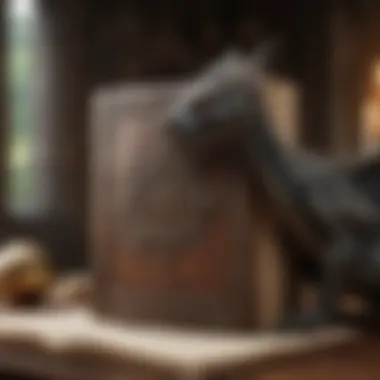
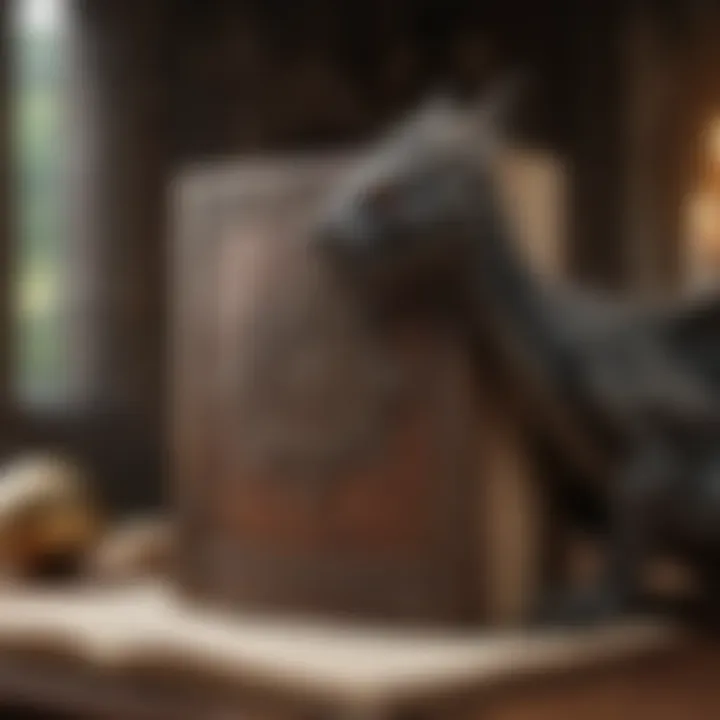
Knowledge of Dragon Behavior
A significant aspect of a dragon keeper’s role lies in their knowledge of dragon behavior. Understanding these creatures goes beyond mere observation; it involves comprehending flight patterns, feeding habits, and responses to different stimuli. This knowledge is crucial to foster a safe environment for both the keeper and the dragon. The keepers must often adapt to the nuances of individual dragons, as each possesses a distinct temperament.
This expertise in dragon behavior serves as a buffer in delicate negotiations during times of conflict. By utilizing this knowledge, a dragon keeper can effectively mediate between the dragons’ needs and the expectations of their human counterparts. Cultivating trust and loyalty is vital, as both keeper and dragon must rely on each other for safety and survival.
Physical Care Requirements
In addition to behavioral knowledge, the physical care requirements of dragons play a crucial role in the responsibilities of the dragon keeper. Dragons demand an intense level of care that encompasses feeding, health monitoring, and maintaining their living conditions. This responsibility stretches beyond merely providing food; it includes an understanding of the nutritional needs specific to each dragon breed.
A unique feature of physical care lies in its demands for both strength and finesse. The physicality of managing a dragon requires considerable effort, yet a delicate touch ensures that the dragon remains comfortable and secure. The advantages of meticulous care establish a bond where the dragon feels respected and valued, fostering loyalty towards the keeper.
By combining knowledge of behavior and attention to physical needs, dragon keepers establish a dynamic and potent relationship with these legendary creatures.
Iconic Dragon Keepers in Game of Thrones
In the lore of Game of Thrones, dragon keepers serve a vital role that intertwines with themes of power, responsibility, and the complexities of human-dragon relationships. These characters, chiefly Daenerys Targaryen, embody the struggles and triumphs often associated with controlling beings of immense power. Exploring key figures in dragon keeping illuminates not only their personal journeys but also broader societal implications regarding dominance and ownership.
Daenerys Targaryen: The Last Dragon Keeper
Her Journey with Dragons
Daenerys Targaryen's journey with dragons is a profound exploration of her identity and connection to power. It begins with the hatching of three dragon eggs, symbols of her lost heritage. From the first moment, Daenerys finds a bond that shapes her destiny. This journey showcases her evolution from a scared young woman into a formidable leader.
One key characteristic of her journey is the transformation she undergoes. Dragons are not merely tools for her ambition; they become extensions of her will. The Dragons often reflect her emotional states, symbolizing both her strength and vulnerability. This aspect makes her journey a compelling choice for discussing dragon keepers, providing insight into how close relationships can define authority and responsibility.
A unique feature of Daenerys's journey is the ethical and emotional complexity it presents. As she gains power and influence, the stakes become higher, and the burden of responsibility intensifies. The advantages of her deep connection to her dragons manifest in her rise to power, while the disadvantages unfold in the relationships strained by this connection.
Symbolism of Power and Loss
The symbolism of power and loss within Daenerys's narrative is significant in understanding the thematic core of dragon keeping. Her relationship with her dragons represents not only empowerment but the inevitable losses that accompany such power. Each dragon serves as a reminder of the personal sacrifices she makes along the way.
A key characteristic is how her dragons symbolize the duality of strength and loss. They elevate her status as a true Targaryen, a bearer of the legacy of House Targaryen, yet they also symbolize the cost of seeking power. This complexity of choices adds depth and weight to the story of the dragon keeper, providing a richer understanding of their role.
Unique to this symbolism is the notion that power comes with isolation. As Daenerys gains control, she loses personal connections—demonstrating how ownership can come at significant emotional costs. The interplay between these symbols illustrates the intricate balance between holding power and facing the stark realities that accompany it.
Other Noteworthy Keepers
Beyond Daenerys, several other characters exemplify the role of dragon keepers in various capacities. They reflect different aspects of the relationship between humans and dragons, highlighting diverse motivations and consequences involved in this unique guardianship.
- Aemon Targaryen depicted an older generation's perspective on dragons, serving as a reminder of the responsibility carried by keepers. His dedication to the Targaryen legacy presents a historical contrast to Daenerys.
- Balerion the Black Dread, although more of a historical figure, serves as a foundational symbol of the Targaryen family connection to dragons, offering insights into hereditary power dynamics.
These characters collectively provide context for understanding the challenges, pressures, and moral dilemmas inherent in dragon keeping, framing a larger conversation about what it means to hold power over mythological beings.
The Psychological Dimensions of Dragon Keeping
Understanding the psychological dimensions of dragon keeping is critical in analyzing the intricate relationship between dragon keepers and their formidable charges. This relationship extends beyond mere ownership or control; it encompasses emotional ties, trust, loyalty, and significant burdens that affect both parties involved. The dragon keeper must navigate these psychological dimensions carefully, as they shape the narrative of power and responsibility within the realm of fantasy.
Bond between Keeper and Dragon
Trust and Loyalty
Trust and loyalty emerge as defining characteristics within the bond between dragons and their keepers. These elements signify more than simple affection; they are the cornerstones of a relationship where both parties rely on one another for survival and success. A keeper who gains the trust of their dragon can more effectively manage its behavior and health, leading to a harmonious existence.
The key characteristic of trust, in this context, is that it takes time and consistent actions to develop. If a keeper fails to be reliable or shows inconsistency, the bond is weakened, which can lead to disastrous outcomes. Loyalty, on the other hand, manifests as a dragon’s willingness to follow its keeper even in perilous situations. This mutual reliance often influences decision-making and can be a matter of life or death.
The unique feature of this relationship is the emotional depth it fosters. However, if one party breaks this trust, it can result in severe consequences. The dragon may become aggressive or unmanageable, while the keeper may experience feelings of guilt or inadequacy.
The Influence of Power Dynamics
Power dynamics significantly influence the relationship between a dragon keeper and their dragon. Understanding this aspect reveals how authority and responsibility shape interactions over time. The power the keeper holds must be balanced with the inherent strength of the dragon. This balance is pivotal in maintaining both order and respect.
A key characteristic of these dynamics is that they are ever-shifting. As dragons grow and mature, so too can their desire for independence. This evolution challenges the keeper’s authority and poses questions about control versus freedom. The unique feature of this dynamic is that it reflects broader themes of dominance in human relationships, highlighting insecurities and the need for control.
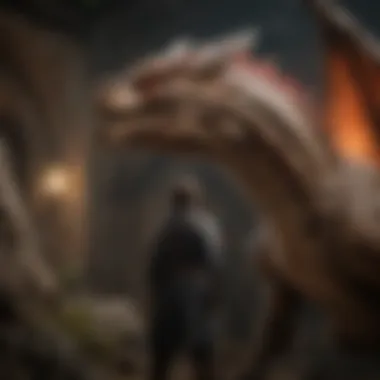
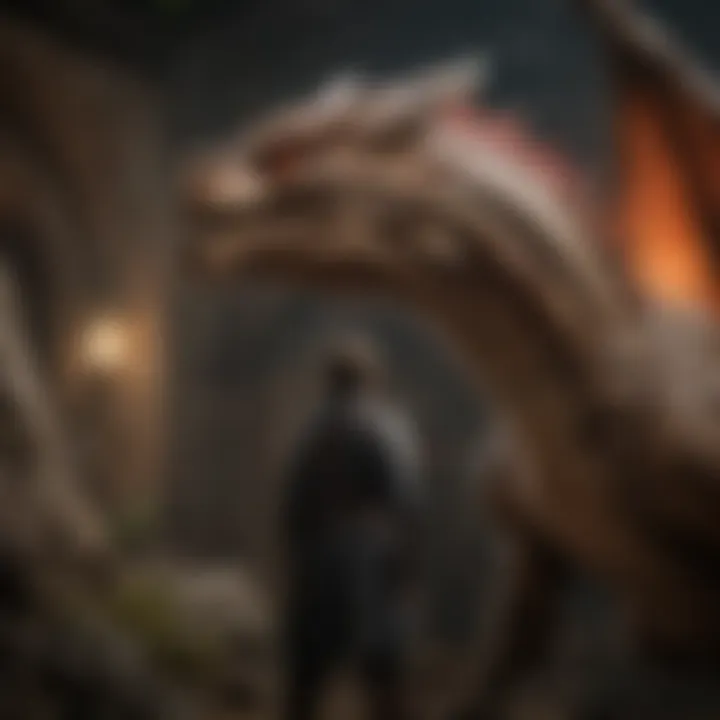
The advantage of understanding power dynamics lies in realizing the necessity of adapting strategies as the relationship evolves. However, one disadvantage is that a misreading of these dynamics can lead to conflict, corruption, or loss of control. When a keeper underestimates a dragon’s capabilities, they may end up provoking rebellion, culminating in dire consequences for both.
The Burden of Responsibility
Emotional Toll
The responsibility of caring for a dragon carries significant emotional tolls. Keepers often find themselves burdened by the weight of their duty. They must make decisions that impact not just their lives but that of their dragons as well. This sense of responsibility can lead to anxiety and stress.
A key characteristic of this emotional toll is the constant fear of failure. The keeper's self-worth can become tied to their dragon’s well-being, casting a looming shadow over their psyche. This stress can affect the keeper’s ability to perform, creating a vicious cycle of worry and potential mismanagement, which further jeopardizes their relationship.
The unique feature of this emotional toll is its complexity, as it can manifest in various forms: from worry about feeding schedules to larger concerns about safety during conflicts. Understanding and addressing this emotional burden is essential to mitigate its adverse effects, yet doing so remains a continuous challenge.
Ablation of Personal Identity
The ablation of personal identity refers to how a dragon keeper’s identity can become intertwined with their role. The demands of keeping a dragon can overshadow aspects of their own life—personal goals, relationships, and mental health may suffer as a result. This dedication is often perceived as admirable, yet it introduces a significant psychological risk: losing oneself entirely in another creature.
The key characteristic of this phenomenon is the blurring of boundaries. The identity of the keeper may become tightly woven with that of the dragon, leading to a diminished sense of self. This makes it challenging for keepers to differentiate their own needs from those of their dragons.
While having a deep connection to a dragon can be fulfilling, the unique feature of this experience is its double-edged nature. While on the one hand, it fosters a profound sense of purpose, on the other, it can lead to isolation and a lack of personal fulfillment. Such risks demand careful consideration, as the line between duty and self can easily become obscured.
"The bond between a dragon and its keeper is not solely one of power; it is an intricate dance of trust, emotion, and identity, reflecting the complexity of their shared existence."
In summary, the psychological dimensions of dragon keeping illuminate the intricate dynamics of the relationships formed in this context. Trust and loyalty shape the bond while power dynamics and the burdens of responsibility add layers of complexity. A comprehensive understanding of these aspects enriches our appreciation of the dragon keeper's role, providing insights into the multifaceted nature of their responsibilities.
Cultural Significance of Dragon Keepers
The role of dragon keepers extends beyond their mere guardianship of these mythical creatures. They embody a rich cultural legacy, reflecting humanity's age-old relationship with power and nature. Within the context of the Game of Thrones universe, dragon keepers serve as a bridge between the tangible and the mystical, blending themes of danger, loyalty, and dominion.
Recognizing this cultural significance, we can observe how dragons symbolize various aspects of societies—strength, freedom, and even destruction. The figures of dragon keepers also highlight the burdens that come with wielding such power. They remind us of the invasive nature of control, which can lead to moral dilemmas complicating one's identity and purpose.
Dragons as Cultural Symbols
Dragons, throughout history and in many cultures, have traditionally been viewed with awe and reverence. They often symbolize immense power, wisdom, and the untamed forces of nature. In some cultures, dragons represent chaos, while in others, they are seen as protectors or deities. Their dual nature captures the complexity of existence—simultaneously revered and feared.
In Westeros, dragons are emblematic of the Targaryen lineage, representing their connection to ancient magic and their rightful place in the realm. The dragons are not just creatures of fire and might; they signify the Targaryens' historical narrative tied to conquest and tragedy. As Daenerys Targaryen embodies this connection, her journey reflects the intricate balance of power and the weight of legacy carried by those who keep the dragons.
Mythology and Folklore Perspectives
Mythology and folklore offer a rich tapestry illustrating the significance of dragon keeping across various cultures. For example, in Eastern traditions, dragons are often depicted as benevolent beings, signifying water, rain, and fertility. In contrast, Western narratives typically portray them as menacing adversaries to be slain.
Across different mythologies, dragon keepers emerge as figures of both strength and vulnerability. They may be seen as heroes or tragic figures, caught in their relationship with these astonishing beasts. This dichotomy raises substantial questions regarding ownership, guardianship, and the moral implications of controlling such mighty beings.
In summary, the cultural significance of dragon keepers reveals layers of interpretation and understanding regarding power and responsibility. They are not merely protectors; they are also embodiments of the complex, often paradoxical, relationship humankind harbors with vast forces that command both respect and fear.
Dragon keepers remind us that with great power comes immense responsibility, often leading to profound ethical considerations that challenge our very essence.
Ethical Considerations in Dragon Keeping
The character of dragon keepers offers a profound ground for questioning ethics within a fantastical setting. In the context of "Game of Thrones", the relationship between dragon keepers and their dragons raises critical ethical dilemmas. This section focuses on two core areas: control and rights. Addressing these concerns not only enriches our understanding of the narrative but also invites deep reflections on the themes of power and morality in the real world.
The Morality of Control
Control is a central tenet when discussing the relationship between dragon keepers and dragons. One must ask: is it morally justifiable to exert dominance over another being, especially one as powerful and intelligent as a dragon? The series illustrates this tension through various characters. For instance, Daenerys Targaryen's bond with her dragons reflects both a connection and an assertion of control.
- The keeper often justifies their relationship with a dragon through a perceived responsibility for its safety and guidance. However, this can quickly turn into a rationalization for ownership that overshadows the dragon’s own autonomy.
- The complexity arises when a keeper's desire for power overshadows ethical obligations towards the creature. Are the dragons willing participants, or mere tools in the grand schemes of their keepers?
This moral dilemma invites the audience to consider the implications of control in their own lives. Often, those who hold power make choices that affect the very beings they are supposed to protect. The responsibility of a dragon keeper extends beyond basic care; it includes respecting the rights and desires of the dragon, challenging the ethics of authority itself.
Rights of the Dragon vs. the Keeper
The contrast between the rights of the dragon and those of its keeper forms a significant foundation for ethical discussion. While keepers may feel entitled to their dragons due to their role, this raises questions of autonomy. Can the powerful creatures in "Game of Thrones" really be seen as mere property or extensions of one's power?
- The essence of a dragon’s identity often gets overshadowed by the achievements of its keeper. Daenerys's struggles with control showcase this issue. Her identity is intricately linked to her dragons, but she must navigate her responsibility towards them without undermining their independence.
- Understanding a dragon as a sentient being rather than an object for control paints the keeper’s role in a more nuanced light. Viewing dragons as partners instead of possessions fundamentally shifts the ethical landscape.
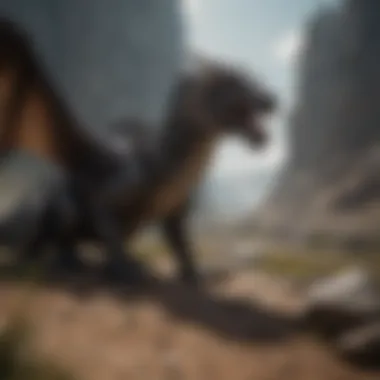
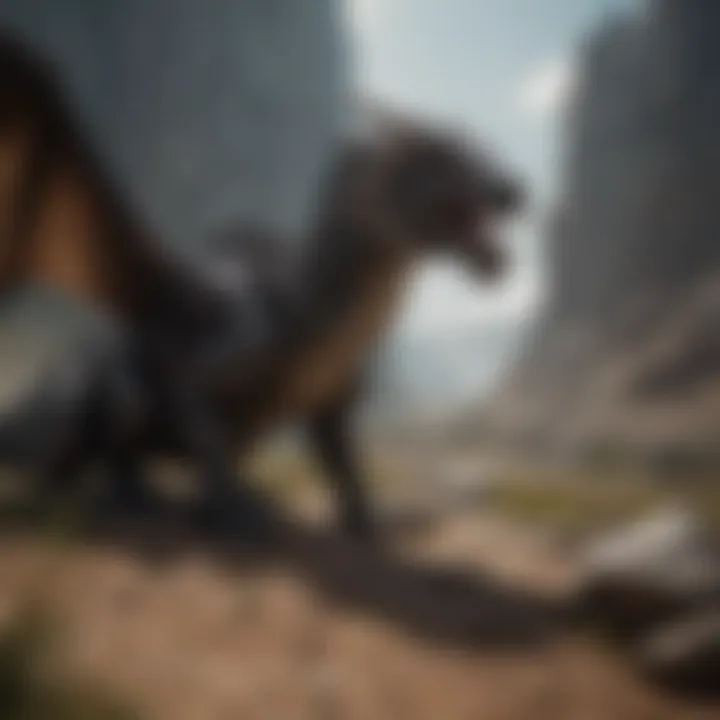
The narrative serves as a mirror, forcing readers and viewers to grapple with their own beliefs about power, responsibility, and respect for other beings. Ultimately, the ethical considerations in dragon keeping reflect larger questions about authority in society, making this topic not only relevant to fantasy but applicable to real-life dynamics of power and agency.
Comparative Analysis: Real-World Guardians
In this section, we will analyze the role of dragon keepers through a comparative lens, looking at real-world guardians such as zoo keepers and wildlife conservationists. This connection is not merely an academic exercise; it reveals profound insights into the dynamics of care, control, and responsibility that transcend the fictional world of Westeros. By examining parallels between these responsible figures and the fictitious dragon keepers, we can better understand the inherent challenges and ethical dilemmas faced in both scenarios.
Zoo Keepers and Wildlife Conservationists
Zoo keepers serve as a prime example of guardianship in real life. They are tasked with the care and management of animals, ensuring their health, safety, and well-being. Their role is multifaceted, encompassing responsibilities in veterinary care, habitat maintenance, education, and conservation efforts. Like dragon keepers, zoo keepers form bonds with their charges. They are often the first line of interaction between the animals and the public, emphasizing the need for a nuanced understanding of animal behavior.
- Education and Awareness: Zoo keepers often engage with visitors, sharing knowledge about species conservation and fostering appreciation for biodiversity. This aspect mirrors the role of dragon keepers in informing others about dragons and their significance.
- Ethical Implications: Just as dragon keepers face ethical considerations regarding their control over dragons, zoo keepers must navigate similar dilemmas. Debates around captivity, animal rights, and natural habitats challenge their practice. In both realms, power dynamics come into play, urging keepers to balance their control with the needs and rights of the creatures in their care.
Zoo keeping teaches valuable lessons about the responsibilities that come with caring for sentient beings. The compassion required cultivates a sense of stewardship, showing how the role of a keeper extends beyond mere control to encompass advocacy for the larger environment.
Cultural and Mythical Figures
Looking beyond practical examples, cultural and mythical figures also offer a rich ground for comparative analysis. Throughout history, various cultures have depicted guardians who establish connections with powerful creatures. Legends often include figures who must keep such beings in check, leading to important questions of power and control.
- Historical Context: Figures like St. George in the dragon-slaying narrative emphasize themes of courage and control over fearsome beasts, drawing parallels with the responsibilities of dragon keepers. They symbolize the necessity of understanding and managing power responsibly.
- Symbolism: The myths surrounding figures like Dragonslayer or Baba Yaga highlight that the relationship between humans and powerful beings is complex. Keepers must act with responsibility and foresight, recognizing the potential for both harm and harmony.
Connecting dragon keeping to these cultural touchstones reveals a deeper narrative about humanity's ongoing relationship with power and responsibility. Each of these figures emphasizes moral choices that echo the dilemmas faced by dragon keepers, enhancing our understanding of their multifaceted roles.
Ultimately, analyzing these real-world parallels encourages a richer discussion about guardianship. It underscores the importance of responsibility, ethical considerations, and the psychological complexities involved. A deeper grasp of these themes allows fans of Game of Thrones to reflect on the nature of power in both fictional and real contexts.
The Future of Dragon Keeping in Westeros
The future of dragon keeping in Westeros raises questions about the legacy of the Targaryens and the potential for new stories to unfold in a land shaped by the fire of dragons. The importance of exploring this future lies in understanding how the bond between keeper and dragon might evolve, as well as recognizing what this represents for the cultural narrative of Westeros. Characters may find new roles, confronted with the realities of power, responsibility and the morality of control over such powerful creatures.
Evolving Narratives Post-Game of Thrones
After the conclusion of Game of Thrones, new narratives can emerge regarding dragon keeping. With the demise of many traditional power structures that featured dragons, there’s an opportunity for fresh perspectives. The question of how future leaders regard dragons could shift. Could dragons become symbols of rebellion or guardians rather than tools of war? This signifies a dramatic change.
New stories may also involve characters with diverse backgrounds taking on the role of dragon keepers, not necessarily following the Targaryen lineage. The potential for non-traditional keepers can enrich the narrative landscape in Westeros. Those who have been oppressed may see the dragons as allies rather than feared beasts.
The historical context established in earlier narratives will still echo, but the relationship between humanity and dragons could evolve beyond mere ownership or dominion into cooperation. In effect, it questions the very nature of power—will the control dynamics shift?
The Implications for New Characters
As the role of dragon keepers evolves, new characters will inevitably emerge, each with unique connections to dragons. The arc of these characters could offer varied interpretations of responsibility and authority. They might embody the struggle between tradition and innovation.
Considering figures outside the loyal Targaryen lineage opens doors for narratives driven by personal motivation and emotional connection rather than inherited right. New characters may personify the complexities of coexistence, exploring themes of trust, empathy, and respect.
- Cultural Diversity: Characters from different cultural backgrounds may have distinct philosophies on dragon stewardship, leading to intriguing interactions.
- New Alliances: Imagine a keeper forging an alliance with a dragon after saving it from capture. This relationship may shift the power dynamic in the realm.
- Conflict and Resolution: Discord may arise from differing ideologies about dragon keeping, echoing larger societal conflicts within Westeros.
The future of dragon keeping in Westeros thus is not merely about the dragons themselves but about the new narratives and characters that will rise around these majestic beings. As the world of Game of Thrones continues to expand, the interplay between human and dragon will remain a focal point for storytelling, balancing themes of power and responsibility.
Ending: Reflecting on the Role of the Dragon Keeper
The role of the dragon keeper is multifaceted and complex. Within the scope of this article, we have explored the various dimensions of dragon keeping, revealing not only the significance of their responsibilities but also the underlying ethical dilemmas and power dynamics involved. The examination of iconic characters, particularly in Game of Thrones, provides a rich context to understand how these individuals navigate their connection with dragons, which often reflects broader themes of power and control.
This exploration brings to light some unique insights. First, the relationship between the keeper and the dragon is not merely one of ownership; it is a bond that demands trust and mutual understanding. The psychological implications of such a bond have far-reaching consequences. For instance, the emotional toll on the keeper cannot be understated. They often grapple with their identity and the weight of their responsibilities.
Additionally, we see that cultural significance plays a pivotal role in shaping the identity of dragon keepers. Different narratives from folklore have shaped perceptions of these caretakers as both mythical figures and real-world analogues, such as zookeepers or wildlife conservationists. This sheds light on how the role has evolved and continues to resonate in contemporary discussions surrounding guardianship and ethics in animal care.
In sum, the dragon keeper symbolizes a bridge between the realms of humanity and the mystical. Their responsibilities encapsulate a delicate balance between nurturing extraordinary beings and adhering to the moral implications of such relationships. This article serves to reflect on their role, offering readers a deeper understanding of the intricate dynamics of power and responsibility that define dragon keeping.
Summation of Insights Gained
Throughout our exploration, several key insights emerged:
- The Nature of Power: The dragon keeper's role underscores the complexities of power. It is not simply about control but also about fostering a symbiotic relationship that respects the autonomy of the dragon.
- Ethical Responsibility: Keepers must confront ethical dilemmas regarding the dragons' rights versus their own need for control. This dynamic raises important questions about guardianship.
- Cultural Reflection: The depiction of dragon keepers in literature shapes societal perceptions and informs the ethical considerations surrounding their role.
- Psychological Impact: The emotional burden of being a keeper affects their identity and decision-making, often leading to profound internal conflicts.
These insights illuminate the intricate relationship between dragon keepers and the majestic creatures they protect. The interplay of power, responsibility, and emotional depth enriches our understanding of this unique role.
Final Thoughts on Power and Responsibility
In contemplating the future of dragon keeping, it is essential to acknowledge the enduring themes of power and responsibility that resonate throughout the narratives explored. As societies evolve, so too do the ethical frameworks surrounding guardianship of powerful beings. The discussions within this article illustrate that dragon keeping is not a relic of antiquity but a contemporary dialogue that challenges our perceptions of control, care, and respect for other life forms.
Ultimately, the dragon keeper's journey is a microcosm of larger themes relevant to our world today. The choices they face are reflective of universal struggles with authority, ethics, and emotional ties. As we conclude this examination, we can appreciate the timeless relevance of these themes in both fantasy and reality. The journey of the dragon keeper continues to inspire, provoke thought, and challenge our understanding of what it means to share our world with powerful beings.



